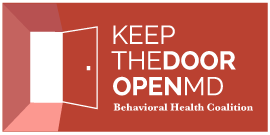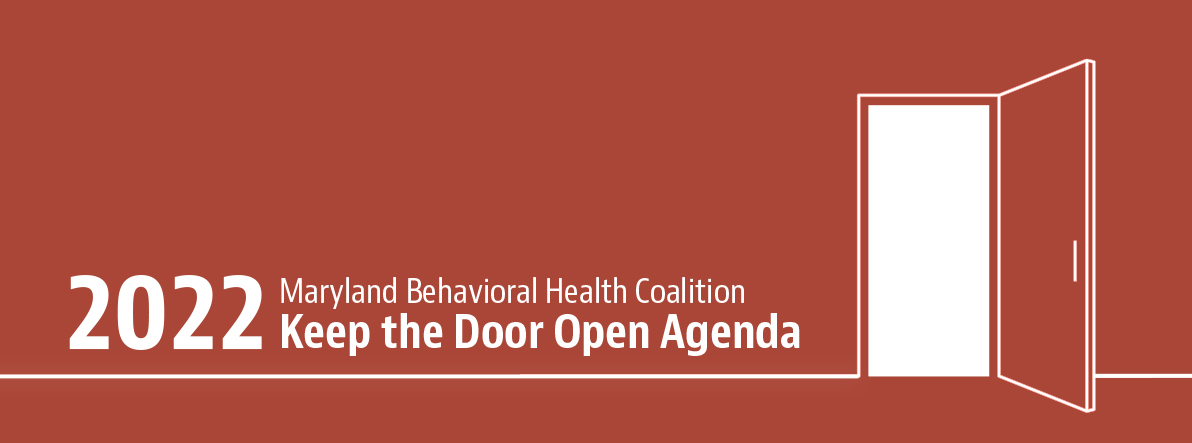The Maryland Behavioral Health Coalition is a diverse mix of organizations working together to ensure individuals living with mental health and substance use disorders have access to high quality services and supports. Membership includes consumer and family advocacy organizations, peer-led groups, community behavioral health providers, professional associations, hospitals, health systems and more.
Trauma, depression, anxiety and overdose rates are at an all-time high, and demand for services continues to rise. There are many positive components of Maryland’s behavioral health system, but after years of neglect and short-term fixes, our mental health and substance use infrastructure is antiquated, inflexible, and crumbling. We can do better.
The Behavioral Health Coalition calls on the Maryland General Assembly to take the following steps in 2022 to enhance our system of care and ensure Marylanders have access to quality mental health and substance use services when and where needed.
Ensure a coordinated community behavioral health system that provides equitable access to quality care
Primary care offices, community behavioral health clinics, and our crisis response network are the roads and bridges of our behavioral health system. They are the main pathways to treatment for individuals with mental health and substance use needs. We must invest in the tools and system reforms necessary to ensure these care providers are able to meet increasing demand for high-quality behavioral health services. The legislature must pass the Behavioral Health System Modernization Act to expand care coordination models like certified community behavioral health clinics (CCBHCs); ensure reliable reimbursement for peers, measurement-based care and crisis services; and increase access to wraparound services for children and youth.
Divert individuals in crisis away from jails and emergency rooms
Too often Marylanders must call police or go to hospital emergency rooms when experiencing a mental health or substance use crisis. A well-resourced crisis response system can serve as a more appropriate alternative. As the United States transitions in 2022 to a standard number for all behavioral health crisis calls (988) we must ensure our system can meet the needs of all Marylanders. The legislature must pass legislation establishing a 988 fund to support an array of crisis services and allocate an initial investment to ensure call centers are adequately staffed and available 24/7.
Address the unique behavioral health needs of children and youth
Children and youth with mental health and substance use needs have fewer treatment options than adults. Prevention and early intervention programs and wraparound services for youth with intensive behavioral health needs are simply not available to many families. Appropriate home- and community-based supports for Black and brown youth are particularly limited. The legislature must enhance Maryland’s system of care for children and youth by passing the Behavioral Health System Modernization Act, supporting system reforms that are co-led and co-designed by youth and families, and reforming Maryland’s broken voluntary placement agreement (VPA) process to support youth and families with the greatest level of need.
Address the unique behavioral health needs of Older Adults
The number of Marylanders over age 60 will increase 30% over the next 20 years – reaching 1.8 million by 2040 – but we are not prepared meet the behavioral health needs of this booming population. Marylanders over 65 account for the largest increase in suicide rates, the longest average length of psychiatric hospital stays, and a steadily increasing overdose rate. The legislature must enhance Maryland’s system of care for older adults by increasing behavioral health support in the state’s area agencies on aging, modernizing the state’s process for screening individuals referred for an institutional level of care, and implementing a recently released interagency plan to meet the behavioral health needs of this population.
Reduce the Harm Associated with Substance Use
Maryland has battled a persistent overdose crisis since well before COVID-19, but pandemic-related stress, grief and despair have exacerbated these concerns. Opioid-related deaths reached a new high in 2020, a disheartening trend that has continued through the first half of 2021. We must embrace harm reduction strategies and establish innovative programming and services that guide people down the road to recovery. The legislature must reduce the harm associated with substance use by expanding Good Samaritan protections for people who report an overdose or other medical emergency.

